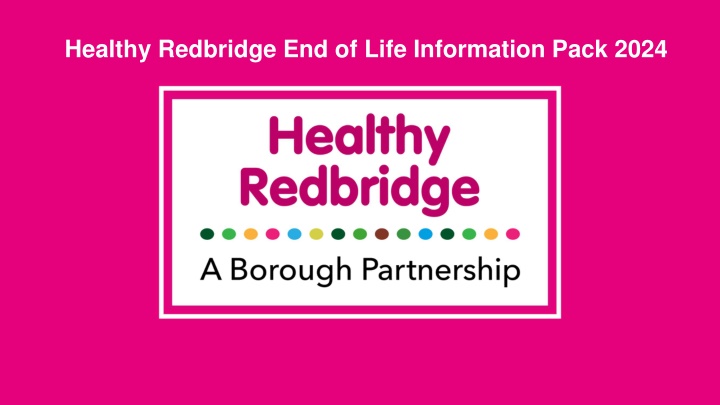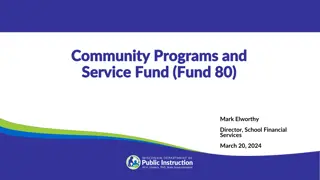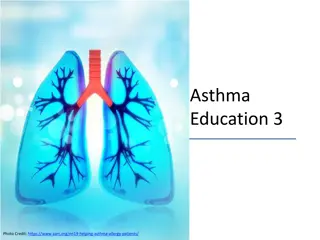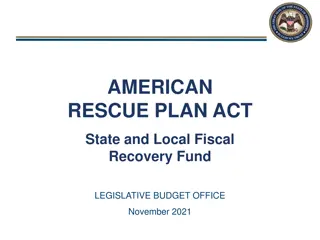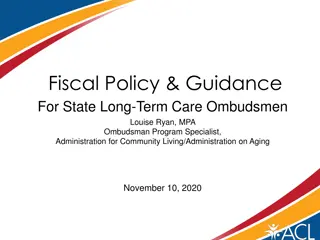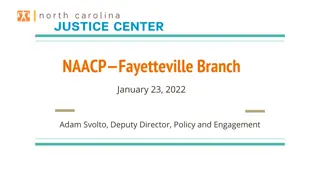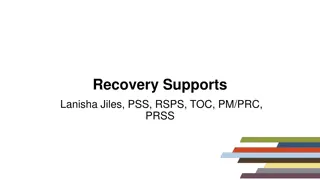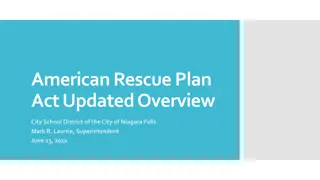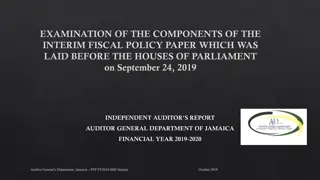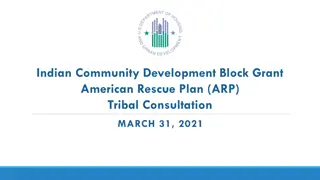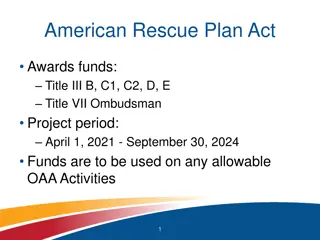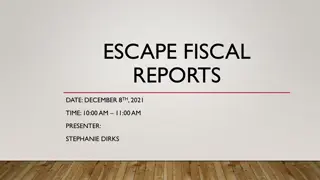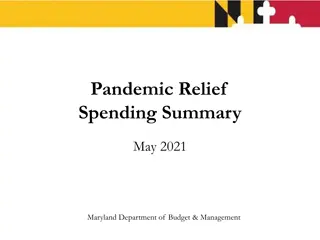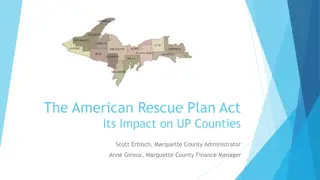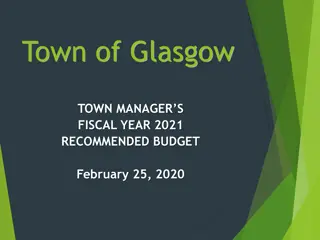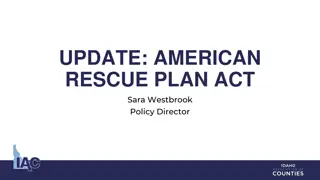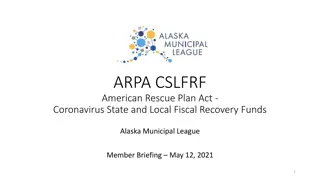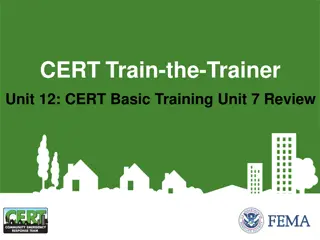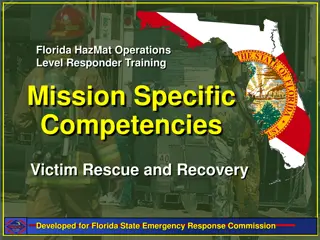American Rescue Plan Act of 2021 Fiscal Recovery Fund Summary
The American Rescue Plan Act of 2021 allocates federal funding to aid state and local governments in their recovery from the COVID-19 pandemic. The funds can be used for various purposes such as responding to the public health emergency, providing premium pay to essential workers, investing in infrastructure, and supporting community initiatives. The Interim Final Rule and Treasury's guidelines outline the usage and timeline for the funds, emphasizing accountability and reporting requirements. Public comments suggest a range of proposals for fund allocation, including bonuses for emergency responders, improvement of public spaces, funding for childcare projects, affordable housing initiatives, and support for essential services like broadband and water infrastructure.
Download Presentation

Please find below an Image/Link to download the presentation.
The content on the website is provided AS IS for your information and personal use only. It may not be sold, licensed, or shared on other websites without obtaining consent from the author.If you encounter any issues during the download, it is possible that the publisher has removed the file from their server.
You are allowed to download the files provided on this website for personal or commercial use, subject to the condition that they are used lawfully. All files are the property of their respective owners.
The content on the website is provided AS IS for your information and personal use only. It may not be sold, licensed, or shared on other websites without obtaining consent from the author.
E N D
Presentation Transcript
About this guide This pack has been designed as a guide for GPs to support their End of Life patients, including support for family and carers. Information has been provided covering the three different stages: Palliative stage End of Life stage (last 12 months of life) Post death and bereavement It provides a step-by-step guide for each stage, and details specialist support services available for family and carers, including where GPs can seek support.
Early Identification Tool Kit The purpose of the below tool kit is to support colleagues in Primary Care in the early identification of people who may be in their last year of life and benefit from an opportunity to discuss a personalised care and support plan. Practices can upload the tool by clicking on the zip folder below: EARLY.zip
When your patient is Palliative When your patient has been identified as palliative, the gold standard approach is to: Complete a Universal Care Plan (UCP) for your patient. Complete Do Not Attempt Resuscitation (DNAR) procedures (this is a medical decision but would require a discussion). o If a DNAR is already in place, please do not remove o If a discussion has taken place with the patient/ family/ carer this should be recorded on the UCP. o If there has been no discussion, this needs to be considered and the patients DNAR status should be recorded.
When your patient is End of Life (Your patient is likely to die within the next 12 months) Patient Review If your patient is stable, they should be reviewed regularly (3 monthly) To note, patients may become unstable during the end of life period and should therefore be reviewed accordingly as they may need to be reviewed more frequently than 3 monthly. If support is needed for uncontrolled symptoms or a patient has specialist palliative care needs, they can be referred to the Specialist Palliative Care Services (refer to slide 7 for contact details). Things that may prompt a referral to palliative care: Unmanaged pain Bowel Management e.g. Constipation / Bowel Obstruction Uncontrolled Nausea / Vomiting Emotional overwhelm in the context of advanced/progressive disease Struggles to address the future/engage with/determine advance care planning
When your patient starts to deteriorate The following actions will need to be taken when your patient starts to deteriorate: If a District Nursing referral has not been completed, this should be done now Consider visiting your patient for supportive reasons GP to advise family in relation to important post death actions (e.g. seeking undertakers) Examples of signs to look out for which suggest deterioration: Reduced oral intake Increase in hospital admissions Reduced mobility Recurrent infections (dependant on diagnosis) Medication Review Injectables medication & PAN London MAAR charts to be completed, see link to access chart https://www.sfh.org.uk/resources-and-advice- list/maar-chart-pan-london-symptom-control Ensure injectable medication and Pan London MAAR is in place at home to enable District Nurses to administer as and when required. All oral medication should be reviewed and rationalised e.g. vitamins, BP tablets, cholesterol, etc. For further information and guidance on prescribing medication when your patient is palliative, you can refer to: end of life and palliative care quick reference guide. Patient Review If your patient is unstable ensure you are supporting and offering regular visits. To note, patients may become unstable during the palliative period and should therefore be reviewed accordingly as stated above.
Support services when your patient is End of Life The below table shows services available for your patient: Service Provider Overview of service Contact Information Specialist Palliative Care Team NELFT Providing support to patients within their own home with specialist palliative care needs. There is a Clinical Nurse Specialist, Palliative OT and Palliative Consultant support. Opening 7 days a week from 9-5pm. T: 0300 300 1901 E:RedbridgeSPCT@nelft.nhs.uk Service accepts direct GP referrals The Hospice - Ward Saint Francis Hospice In-patient beds 24/7 to manage symptoms for short in-patient stay and to accommodate patients at end of life for their preferred place of death. https://www.sfh.org.uk/our-hospice-services Service accepts direct GP referrals District Nursing NELFT Providing nursing care, administration of medication and support to palliative care patients. Service is 24/7. T: 0208 554 9172 (24hr helpline) https://www.nelft.nhs.uk/services-redbridge-district-nursing Services accepts direct GP referrals End of Life Facilitator (Care Home patients only) NELFT Clinical Nurse specialist providing support to nursing homes and GPs regarding end of life care for residents. Provides EOL training to care home staff, GPs and District Nurses. Rainer Buffonge T: 07745 737 846 E:rainer.buffonge@nelft.nhs.uk Marie Curie Helpers Marie Curie Volunteers helping those with a terminal illness or is someone is looking after someone who is terminally ill. T: 0207 091 4135 E:londonvolunteering@mariecurie.org.uk Hospice at Home Saint Francis Hospice The team offers blocks of care to people in their last few weeks of life in their home. Opening 7 days a week 9am -9pm. https://www.sfh.org.uk/our-hospice-services Accepts direct GP referrals Advice Line 5pm -8am Saint Francis Hospice Clinical Nurse Specialist for patients, families, and professionals. The advice line can be used for urgent advice, when extra care is needed, or when someone is facing a crisis. https://www.sfh.org.uk/our-hospice-services T: 01708 758 643 (this line is open to family, carers, patients and professionals) Direct access for GPs on advice line
Support Services for carers and family Palliative and End of Life If a family are no longer able to provide care, a referral to social services / fast track via Continuing Health Care can be completed to request/provide carers up to four times a day if eligible. The below table shows the support services available for palliative / end of life patients: Service Provider Overview of service Contact Information Redbridge Carers Support Service (RCSS) Voluntary Organisation RCSS provide unpaid carers with a range of services, support and recognition. https://www.rcss.org.uk/ Marie Curie Helpers Marie Curie Volunteers helping those with a terminal illness or is someone is looking after someone who is terminally ill. londonvolunteering@mariecurie.org.uk T: 0207 091 4135 Jonathan Stupples, Volunteer Co-ordinator E: Jonathan.stupples@mariecurie.org.uk Night sitting Community Palliative Team via DeVere Care Offering a service for those patients with a life limiting and incurable disease. The aim is for patients to be supported and cared for in their own homes. T: 0300 300 1901 (daily 9am-5pm): T: 01708 758 643 (daily out of hours 5pm-9am). Support for a home visit by the out of hours District Nurse Team: 020 8554 9172 E: Redbridgespct@nelft.nhs.uk Grief Caf Creating Conversations Voluntary Organisation A safe place for people to talk about death, dying and grief, and providing information and support on how to start such conversations. Also raining the importance of planning for someone s end of life. https://creatingconversations.uk/events/list/ Saint Francis Specialist advice line (appliable if patient is known to Saint Francis) Saint Francis Hospice Clinical Nurse Specialist for patients, families, and professionals. The advice line can be used for urgent advice, when extra care is needed, or when someone is facing a crisis. https://www.sfh.org.uk/our-hospice-services T: 01708 758 643 (this line is open to family, carers, patients and professionals) Medical Examiner BHRUT Medical examiners are senior medical doctors who are trained in the legal and clinical elements of death certification processes. T: 01708 504343 9am-5pm Monday to Friday Saturdays/Sundays and BHs there is service from 8am to 12pm for urgent death certificates (e.g. for faith deaths). E: bhrut.medicalexamineroffice@nhs.net
When your patient has died The following actions should be carried out once your patient has died: 1. The death should be verified by a GP. 2. Some nurses and paramedics can verify the death, but only if: They have had the appropriate training, And if the patient has been seen by a GP within the last 28 days, And only if it is an expected death. 3. Once the death has been verified, the family / carers can then call the undertaker (refer to slide 11 for pathway). 4. Every death (apart from those referred to the coroner) will be scrutinised by a Medical Examiner, including urgent faith burials out of hours. The GP will need to complete a Medical Certificate of Cause of Death (MCCD) along with referral form to the Medical Examiner Service. The sooner steps 1- 4 are carried out, the better for the family. 5. Advise family all injectable medication needs to returned to their local pharmacy. Please note: If your patient is from a Muslim or Jewish faith, death would need to be verified as a matter of urgency as burial normally takes place within 24 hours post death.
Support Services available for carers and family when their loved one has died The below table shows support services available for carers and family: Service Provider Overview of service Contact Information Grief Caf Creating Conversations Voluntary Organisation The grief caf is a safe and confidential space to meet others, to share and explore thoughts and feelings around the experience of grief and loss. Home - Creating Conversations upcoming scheduled events can be found https://creatingconversations.uk/events/list/ Bereavement Support Orange Line Saint Francis Hospice The helpline is a confidential telephone support for local people and help make connections, start new friendships or simply provide guidance and information. https://www.sfh.org.uk/orangeline-helpline Drop-in Bereavement Centre Charity Organisation The centre provides ongoing help and support for bereaved individuals and families. It aims to assist them in coming to terms with bereavement. It seeks to help in making a real and sustained difference in the community. Face-to-face counselling sessions are held on Tuesday at Ilford. https://www.thedropinbereavementcentre.co.uk/ Face-to-face counselling referral: 2023+1-2- 1+Counselling.pdf (squarespace.com) T: 0207 511 6444 or 07396 016523 E: dropinbereavement@btinternet.com Healing Hearts Bereavement Support Group Voluntary Organisation The aim of the group is to enable successful grieving to occur. This is done by offering support, help and assistance to cope with what is happening. Meetings are held every 4-5 weeks, start time 7pm. Venue: The Hainault Forest Community Association, 100b Manford Way, Chigwell, Essex, IG7 4DF Pat Peake 020 8500 4838 Mary Casey 07710155360 Age UK Voluntary Organisation This guide gives information about what to get done first, how to register the death, and how to arrange a funeral. It also covers who to tell about the death and the kinds of financial and emotional support that might be available. Click here to access the guide
